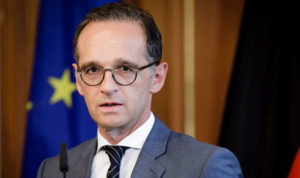September 21, 2018

Europe is struggling to find some way to bypass the Trump sanctions and maintain some trade with Iran.
Officials generally admit that there is no way they can clear a path for major European firms with household names like Siemens and Total because those huge international firms all have major business ties with the United States they are unwilling to put at risk for the sake of the small market that Iran constitutes.
But many officials feel it is possible to construct a system that will support small and medium-sized European businesses that want to do business in Iran—that is, companies that do not do business in the United States and are eager to go into a market where they will not face American competitors—not necessarily the kinds of firms Iran is most interested in doing business with.
The key would be to have a payment mechanism that would operate only in the euro and would not touch the US dollar, thus avoiding the US prohibition on using dollars for transactions with Iran.
The biggest problem from the Iranian standpoint is that these firms want to sell to Iran. Few are likely to invest anything in the Islamic Republic. What Iran is mainly interested in is getting European capital invested in Iran and allowing Iran to buy European technology that few small and medium sized firms can provide.
Small and medium-sized firms have considerable political push in most countries. That’s an added reason for the effort by Europe to find some way around US sanctions.
Yet another motivator is the burgeoning anger at the United States for acting like a bully under President Trump and using US financial clout to order Europe to abide by US sanctions.
The first idea that was floated in the EU was to use the European Investment Bank, which is owned by the EU, as the clearinghouse. But the EIB primarily deals in investments and raises the majority of its capital in the United States. It said it would not touch Iran.
Germany, Britain and France said they are working together on possible financing solutions to sidestep US sanctions, including a possible role for their central banks.
French Finance Minister Bruno Le Maire said August 27, “With Germany, we are determined to work on an independent European or Franco-German financing tool which would allow us to avoid being the collateral victims of US extra-territorial sanctions. I want Europe to be a sovereign continent, not a vassal, and that means having totally independent financing instruments that do not today exist.”
German Foreign Minister Heiko Maas spoke up the same day, saying the EU is working to protect economic ties with Iran and keep payment channels open. Maas urged a proposal to make an international payment system like SWIFT (the Society for Worldwide Interbank Financial Telecommunication, headquartered in Belgium, which processes most international banking transactions) more independent of the US. Most commentary so far has been negative, with bankers saying they have little interest in having to join two transaction systems, when the whole point of SWIFT was to ensure there was only one.
Le Maire acknowledged that using the European Investment Bank as a “financial channel” would be “very complicated” and that the French and German governments are talking to their respective central banks about their involvement. “If we want to build a truly independent instrument, we must open up all the options,” he said.
Maas said that while most of the “very difficult questions on the details” of any payment system are unresolved, at least the alternative of a nuclear escalation in the Middle East has so far been avoided.
“We have to react and strengthen Europe’s autonomy and sovereignty in trade, economic and finance policy,” Maas said in a speech in Berlin.
Canadian Foreign Minister Chrystia Freeland also spoke at the event and said that her nation shares the goal of preserving a multilateral world order.
Nothing any of these people have said pointed to any practical way to solve the sanctions challenge. Desire was widespread, but a solution was nowhere in sight despite many months of talk.
Meanwhile, in Tehran, Ahmad Pourfallah, the head of the Iran-Italy Chamber of Commerce, said Italy has agreed to revive a number of bankrupt Italian banks with euro-funding so they could handle trade with Iran. He said there are many banks in Italy that are not dependent on the dollar and are already working with Iran. He did not explain why there would be a need to revive bankrupt banks if there was already “a number” of functioning banks working with Iran in the euro.